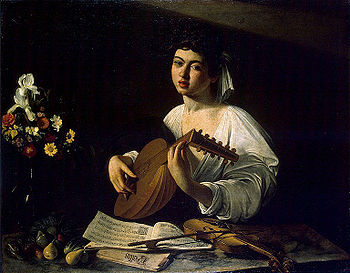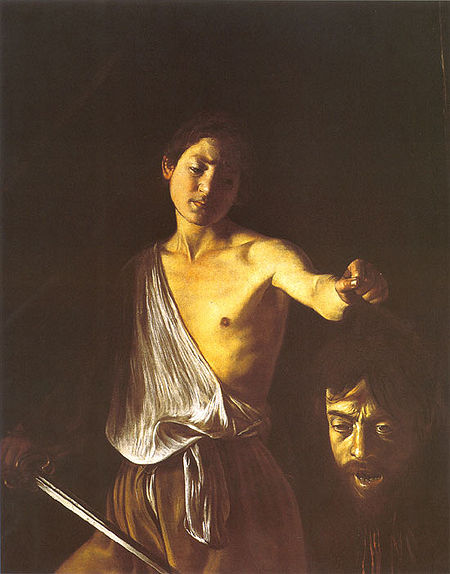Difference between revisions of "Michelangelo Merisi da Caravaggio"
(→External links) |
DavidB4-bot (Talk | contribs) (Spelling, grammar, and general cleanup, typos fixed: ’s → 's, 1594-1595 → 1594–1595 (6)) |
||
| (16 intermediate revisions by 3 users not shown) | |||
| Line 1: | Line 1: | ||
[[Image:Caravaggio.JPG|left|100px]] | [[Image:Caravaggio.JPG|left|100px]] | ||
| − | '''Michelangelo Merisi da Caravaggio''' (September | + | '''Michelangelo Merisi da Caravaggio''' (September 29, 1571 – 18 July 1610) was an [[Italian]] [[Baroque]] [[painter]] with great influence both in Italy and abroad. He was born in Caravaggio (just outside Milan), Lombardy, [[Italy]]. He took his name from the village where he was born. |
Caravaggio painted [[Roman]] gods and [[Christian]] saints as if emerging out of darkness. Most of his religious paintings emphasize sadness, suffering and death. | Caravaggio painted [[Roman]] gods and [[Christian]] saints as if emerging out of darkness. Most of his religious paintings emphasize sadness, suffering and death. | ||
<blockquote> | <blockquote> | ||
| − | Caravaggio is particularly renowned for his use of chiaroscuro, a technique that uses light and dark to achieve a 3-D effect. [http://www.artbible.info/art/biography/caravaggio] | + | Caravaggio is particularly renowned for his use of chiaroscuro, a technique that uses light and dark to achieve a 3-D effect. [http://www.artbible.info/art/biography/caravaggio] He is also known for his bold, realistic style and the dramatic expression of his striking compositions. [https://artsy.net/artist/michelangelo-merisi-da-caravaggio] |
</blockquote> | </blockquote> | ||
| − | Caravaggio had an extraordinary influence in his time, as he turned [[Europe | + | Caravaggio had an extraordinary influence in his time, as he turned [[Europe]]an art from the ideal viewpoint of the [[Renaissance]] to focus on the idea that simple [[Realism|reality]] was of primary importance. He chose common people as his subjects and painted them in ordinary surroundings. Caravaggio's realism and chiaroscuro technique made a lasting impression on generations of artists, including [[Rubens]], [[Rembrandt]], [[Diego Velázquez]] and [[Bartolomé Esteban Murillo]]. [https://artsy.net/artist/michelangelo-merisi-da-caravaggio] |
Caravaggio was the first great representative of the [[Baroque]] Era. | Caravaggio was the first great representative of the [[Baroque]] Era. | ||
| Line 16: | Line 16: | ||
== Petite Gallery == | == Petite Gallery == | ||
| + | |||
<center> | <center> | ||
| − | <gallery perrow=" | + | <gallery perrow="6"> |
| + | File:Caravaggio, The Young Bacchus, ca. 1589.jpg|The Young Bacchus, ca. 1589. | ||
| + | Image:Caravaggio. The Cardsharps.JPG|The Cardsharps, ca. 1594–1595. | ||
| + | File:Caravaggio, Penitent Magdalene, ca. 1595.jpg|Penitent Magdalene, ca. 1595. | ||
File:Caravaggio St Francis in Ecstasy c 1595.jpg|St. Francis in Ecstasy, ca. 1595. | File:Caravaggio St Francis in Ecstasy c 1595.jpg|St. Francis in Ecstasy, ca. 1595. | ||
| + | Image:Michelangelo Caravaggio 065.jpg|Narcissus, 1597–1599. | ||
| + | File:Caravaggio, The Calling of St Matthew, 1599-1600.jpg|The Calling of St Matthew, 1599–1600. | ||
| + | Image:DavidandGoliath.jpg|David and Goliath, 1600. | ||
File:Caravaggio Ecce Homo.JPG|Ecce Homo, 1600. | File:Caravaggio Ecce Homo.JPG|Ecce Homo, 1600. | ||
| + | Image:Caravaggio The Crucifixion of Saint Peter,.JPG|The Crucifixion of Saint Peter, 1600–1601. | ||
| + | Image:Caravaggio Supper at Emmaus.jpg|Supper at Emmaus, 1601. | ||
File:Caravaggio The Inspiration of Saint Matthew.jpg|The Inspiration of Saint Matthew, 1602. | File:Caravaggio The Inspiration of Saint Matthew.jpg|The Inspiration of Saint Matthew, 1602. | ||
File:Caravaggio Nativity with San Lorenzo and San Francesco 1609.jpg|Nativity with San Lorenzo and San Francesco, 1609. | File:Caravaggio Nativity with San Lorenzo and San Francesco 1609.jpg|Nativity with San Lorenzo and San Francesco, 1609. | ||
| − | |||
| − | |||
| − | |||
| − | |||
| − | |||
| + | </gallery> | ||
| − | + | [[File:Caravaggio, Death of the Virgin Mary.jpg|thumb|center|400px|Death of the Virgin Mary, 1605–1606.]] | |
</center> | </center> | ||
== See also == | == See also == | ||
| − | [[Image:Caravaggio. The Raising of Lazarus.JPG|thumb|The Raising of Lazarus]] | + | [[Image:Caravaggio. The Raising of Lazarus.JPG|thumb|The Raising of Lazarus, ca. 1608–1609.]] |
*[[Painting Schools]] | *[[Painting Schools]] | ||
| − | *[[Painting Masterpieces ]] | + | *[[Painting Masterpieces]] |
*[[Carlino Dolci]] | *[[Carlino Dolci]] | ||
*[[Sir Lawrence Alma Tadema/Gallery]] | *[[Sir Lawrence Alma Tadema/Gallery]] | ||
*[[Most Popular Paintings in Conservapedia]] | *[[Most Popular Paintings in Conservapedia]] | ||
| + | *[[History of painting]] | ||
| + | *[[Italian Painting]] | ||
== External links == | == External links == | ||
| Line 48: | Line 55: | ||
| − | : | + | [[File:Caravaggio, Entombment, 1603-1604.jpg|thumb|Entombment, 1603–1604.]] |
| + | :: [[File:Carav david goliath.jpg|450px]] [[David with the Head of Goliath]], 1610. | ||
| + | |||
| + | <br> | ||
| + | ::::: [[File:Caravaggio, St. Catherine of Alexandria, 1598.jpg|thumb|center|300px|St. Catherine of Alexandria, 1598.]] | ||
| − | {{DEFAULTSORT: Merisi da Caravaggio, Michelangelo}} | + | {{DEFAULTSORT:Merisi da Caravaggio, Michelangelo}} |
[[Category:Italian Painters]] | [[Category:Italian Painters]] | ||
Latest revision as of 06:45, April 21, 2020
Michelangelo Merisi da Caravaggio (September 29, 1571 – 18 July 1610) was an Italian Baroque painter with great influence both in Italy and abroad. He was born in Caravaggio (just outside Milan), Lombardy, Italy. He took his name from the village where he was born.
Caravaggio painted Roman gods and Christian saints as if emerging out of darkness. Most of his religious paintings emphasize sadness, suffering and death.
Caravaggio is particularly renowned for his use of chiaroscuro, a technique that uses light and dark to achieve a 3-D effect. [1] He is also known for his bold, realistic style and the dramatic expression of his striking compositions. [2]
Caravaggio had an extraordinary influence in his time, as he turned European art from the ideal viewpoint of the Renaissance to focus on the idea that simple reality was of primary importance. He chose common people as his subjects and painted them in ordinary surroundings. Caravaggio's realism and chiaroscuro technique made a lasting impression on generations of artists, including Rubens, Rembrandt, Diego Velázquez and Bartolomé Esteban Murillo. [3]
Caravaggio was the first great representative of the Baroque Era.
Petite Gallery
See also
- Painting Schools
- Painting Masterpieces
- Carlino Dolci
- Sir Lawrence Alma Tadema/Gallery
- Most Popular Paintings in Conservapedia
- History of painting
- Italian Painting
External links
- Michelangelo Merisi
- Caravaggio Olga's Gallery.


















